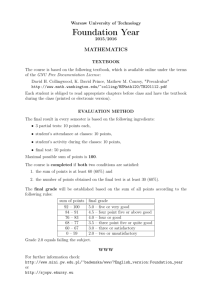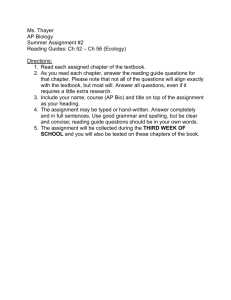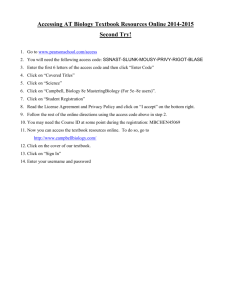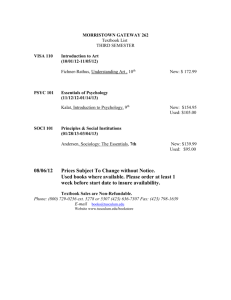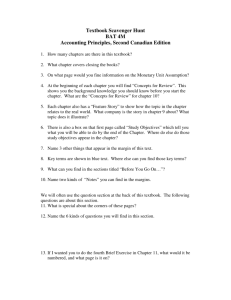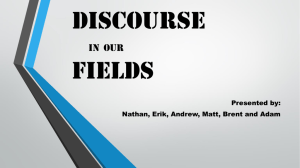Week 5
advertisement
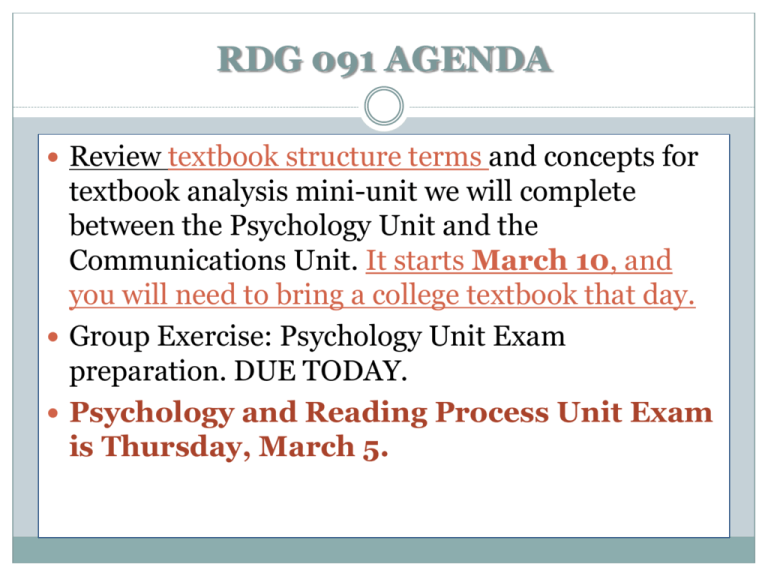
RDG 091 AGENDA Review textbook structure terms and concepts for textbook analysis mini-unit we will complete between the Psychology Unit and the Communications Unit. It starts March 10, and you will need to bring a college textbook that day. Group Exercise: Psychology Unit Exam preparation. DUE TODAY. Psychology and Reading Process Unit Exam is Thursday, March 5. Text Organization and Its Relationship to Reading Comprehension Well-presented physical text facilitates reading comprehension. RESEARCH SHOWS: Student awareness of text structure is highly related to student reading comprehension. Explicit instruction in the physical presentation of text and/or text structure facilitates reading comprehension. That’s what we will be doing with the textbook project the week after next. Textbook Study: Key Vocabulary TEXT STRUCTURE: External structures – the way the text is physically presented; today’s focus is on these physical text features/structures. Internal structures – the way the actual content is developed through organizational patterns of development such as cause/effect, comparison/contrast, definition, etc. Take a “big picture” look at your textbooks: Physical Text Features that Facilitate Learning Title and Type of Source (book, magazine, online source) layout Target audience Publishing Information Authors/editors; author bio and background notes Preface Table of Contents Glossary Index Headings Subheadings Questions Summaries Auxiliary content such as additional text boxes, maps, online links, quotations from the text or elsewhere, images, charts, diagrams, etc. References You probably can find others! Textbook Study: Key Vocabulary • • Organizational Patterns of Text – “Patterns of development” that authors or editors use to structure the textbook’s text. Understanding these internal structures help you comprehend texts. (Even when you write yourself, you use these “patterns of development” to build an essay or write a narrative!) explaining by example, illustration, supporting detail, facts comparison/contrast (similarities and differences) cause/effect classification (types/kinds) narration (“story”) extended definition analysis (break down into parts) process (how something works) argument Preparing for the Psychology Unit Exam March 5 The main ideas in five articles we have read. You should know what the main idea is in the chapters and article and to recognize and apply information that supports, explains, and illustrates those main ideas. Reading process terms and strategies including the following: background or prior knowledge, SQ5R, Cornell notes, elaborative rehearsal, definitions and key terms. Today’s Group Exercise: Create Test Questions for Unit Exam CREATE one multiple choice question for EACH of these readings: “Even Geniuses Need to Work” “Why Science?” “The Nature/Nurture Question” “Emerging Adulthood” “Intelligence and Achievement Testing” CREATE a list of the top fifteen new words that are most important to know from our five psychology readings. DEFINE each term on your list completely. In other words, what fifteen words would you tell a friend to study who was about to embark on this psychology unit in a reading class? Create One “Story” Multiple Choice Question for “Emerging Adulthood” Review the models in the practice quiz from last week to guide you. Make sure the situation (“story”) you present in the “stem” of the prompt is very clear to all readers in the group! Read it aloud to make sure it makes sense. Exercise Checklist Each group turns in: One set of five questions; one for each reading ONE “story” multiple choice question based on “Emerging Adulthood” One list of fifteen “essential” words for this unit, including definitions. Work must be reviewed and “proofed” by each group member before turning it in. Put names of all group members on the sheets you turn in. Next Week Next Tuesday, 3/3: Unit Review Next Thursday, 3/5: Unit Exam Bring your psych articles and notebook. Begin reviewing course content thus far as it relates to what the exam will cover and be prepared to ask any questions you have about it or the exam on Tuesday. FOR Tues. 3/10: Bring a textbook from another course
